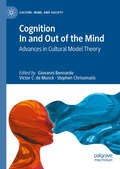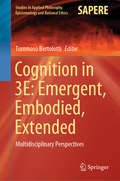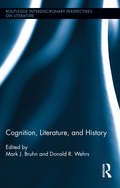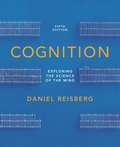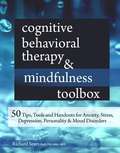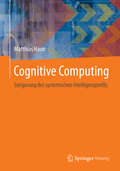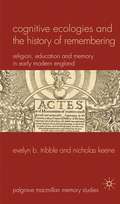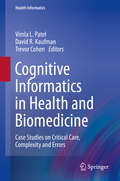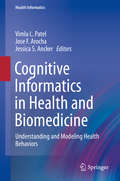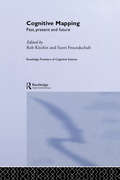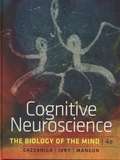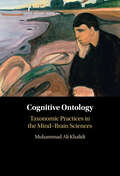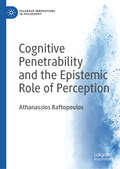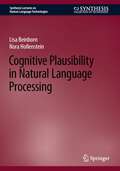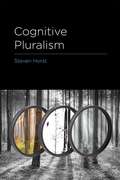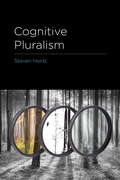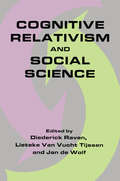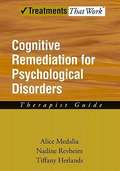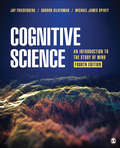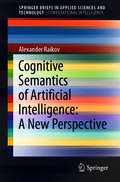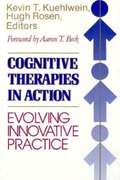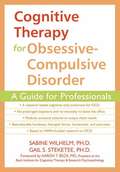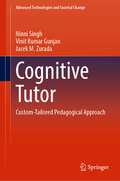- Table View
- List View
Cognition In and Out of the Mind: Advances in Cultural Model Theory (Culture, Mind, and Society)
by Victor C. de Munck Giovanni Bennardo Stephen ChrisomalisThis edited collection presents an agenda for the interdisciplinary study of anthropology and cognitive science. It consists of fifteen chapters written by international experts on the relationship between culture and cognition. This volume is unique in that it includes both inside (i.e., shared mental templates) and outside (i.e., extended, embedded, enactive and ecological) theories of cognition. The contributors come from the diverse disciplinary fields of anthropology, linguistics, archaeology, and cognitive science. The aim is to investigate the mental production of shared knowledge, goals, and desires around which human social life revolves. The coverage spans cultural and linguistic evolution, the importance of local histories, and the role of cultural models to understand and interact with the world. Drawing on cultural model theory, this volume is an invaluable resource for linguists, cognitive scientists, anthropologists, and other social scientists willing to explore and understand how the sharedness of culture can bond us all together across relative cultural differences and (mis)perceived divisions.
Cognition and the Brain
by Andrew Brook Kathleen AkinsAn up-to-date and comprehensive overview of the philosophy and neuroscience movement.
Cognition in 3E: Multidisciplinary Perspectives (Studies in Applied Philosophy, Epistemology and Rational Ethics #56)
by Tommaso BertolottiThis book originated at a workshop by the same name held in May 2018 at the University of Pavia. The aim was to encourage a cross-disciplinary discussion on the limits of cognition. When venturing into cognitive science, notwithstanding the approach, one of the first riddles to be solved is the definition of cognition. Any definition immediately sparks the ascription debate: who/what cognizes? Definitions may appear either too loose, or too demanding. Are bacteria included? What about plants? Is it a human prerogative? We engage in the quest for artificial intelligence, but is artificial cognition already the case? And if it was a human prerogative, are we doing it all the time? Is cognition a process, or the sum of countless sub processes? Is it in the brain, or also in the body? Or does it go beyond the body? Where does it start? Where does it end? We tried answering these questions each from our own perspectives, as philosophers, ethnographers, psychologists and rhetoricians, handing each other our peculiar insight.
Cognition, Literature, and History (Routledge Interdisciplinary Perspectives on Literature)
by Donald R. Wehrs Mark J. BruhnCognition, Literature, and History models the ways in which cognitive and literary studies may collaborate and thereby mutually advance. It shows how understanding of underlying structures of mind can productively inform literary analysis and historical inquiry, and how formal and historical analysis of distinctive literary works can reciprocally enrich our understanding of those underlying structures. Applying the cognitive neuroscience of categorization, emotion, figurative thinking, narrativity, self-awareness, theory of mind, and wayfinding to the study of literary works and genres from diverse historical periods and cultures, the authors argue that literary experience proceeds from, qualitatively heightens, and selectively informs and even reforms our evolved and embodied capacities for thought and feeling. This volume investigates and locates the complex intersections of cognition, literature, and history in order to advance interdisciplinary discussion and research in poetics, literary history, and cognitive science.
Cognition: Exploring the Science of the Mind (Fifth Edition)
by Daniel ReisbergCognition uses the best of current research to help students think like psychologists and understand how cognitive psychology is relevant to their lives. The Fifth Edition offers a streamlined presentation, introduces an attractive new full-color design and an expanded art program, and has been thoughtfully updated with the best of current research.
Cognitive Behavioral Therapy & Mindfulness Toolbox: 50 Tips, Tools And Handouts For Anxiety, Stress, Depression, Personality And Mood Disorders
by Richard SearsCognitive Behavioral Therapy (CBT) has been an effective intervention for decades, but few clinicians have discovered the powerful treatment results of combining CBT with Mindfulness. Clinical psychologist and mindfulness expert Dr. Richard Sears has created a practical, engaging skills manual that clearly defines the principles of CBT and then demonstrates steps for integrating mindfulness practices into therapy -- all drawing from the latest research. Straight-forward explanations and dozens of worksheets provide fresh insights and new tools to move therapy forward when treating stress, anxiety, panic, depression, pain, trauma, addictions, and other issues.
Cognitive Computing: Steigerung des systemischen Intelligenzprofils
by Matthias HaunZiel des Buches ist, artifizielle Systeme als kognitive Modelle und damit als wissensbasierte Agenten zu konzeptionalisieren und diese Agentenmodelle durch rechnerbasierte Technologien in prozessualer und funktionaler Hinsicht zu kognitiven Probleml#65533;sungssysteme auszugestalten. Das Ziel eines solchen Ansatzes liegt in der Steigerung des systemischen Kognitionsquotienten solcher Systeme. Erreichbar wird dieses Ziel durch die Konzeptionalisierung von Modellen auf Basis einer Kognitionstheorie, der (Aus)implementierung dieser Modelle durch den Einsatz der Cognitive Computing Technologie unter Verwendung der Programmiersprache Java und der Validierung dieser L#65533;sungen im Rahmen von Simulationen. Das Buch wendet sich gleicherma#65533;en an Studierende, Fachleute aller Fachrichtungen als auch den interessierten Leser. Indem die einzelnen Kapitel einen Br#65533;ckenschlag zwischen Standardwissen und Wissen aus Nachbargebieten, wie Kognitionswissenschaft oder Informatik darstellen, versucht dieses Handbuch ein tiefgreifendes Verst#65533;ndnis des komplexen Themengebietes ,,Artifizielle Kognition" zu erm#65533;glichen und dabei dennoch voraussetzungsfrei lesbar zu bleiben.
Cognitive Ecologies and the History of Remembering
by Evelyn B. Tribble Nicholas KeeneThis book unites research in philosophy and cognitive science with cultural history to re-examine memory in early modern religious practices. Offering an ecological approach to memory and culture, it argues that models derived from Extended Mind and Distributed Cognition can bridge the gap between individual and social models of memory.
Cognitive Informatics in Health and Biomedicine: Case Studies on Critical Care, Complexity and Errors (Health Informatics)
by Vimla L. Patel David R. Kaufman Trevor CohenEnormous advances in information technology have permeated essentially all facets of life in the past two decades. Formidable challenges remain in fostering tools that enhance productivity but are sensitive to work practices. Cognitive Informatics (CI) is the multidisciplinary study of cognition, information and computational sciences that investigates all facets of human computing including design and computer-mediated intelligent action, thus is strongly grounded in methods and theories from cognitive science. As an applied discipline, it has a close affiliation with human factors and human-computer interaction, and provides a framework for the analysis and modeling of complex human performance in technology-mediated settings and contributes to the design and development of better information systems. In recent years, CI has emerged as a distinct area with special relevance to biomedicine and health care. In addition, it has become a foundation for education and training of health informaticians, the Office of the National Coordinator for Health Information Technology initiating a program including CI as one of its critical elements to support health IT curriculum development. This book represents a first textbook on cognitive informatics andwill focus on key examples drawn from the application of methods and theories from CI to challenges pertaining to the practice of critical-care medicine (CCM). Technology is transforming critical care workflows andre-organizing patient care management processes. CCM has proven to be a fertile test bed for theories and methods of cognitive informatics. CI, in turn, has contributed much to our understanding of the factors that result in complexity and patient errors. The topic is strongly interdisciplinary and will be important for individuals from a range of academic and professional backgrounds, including critical care specialists, psychologists, computer scientists, medical informaticians, and anthropologists.
Cognitive Informatics in Health and Biomedicine: Understanding and Modeling Health Behaviors (Health Informatics)
by Vimla L. Patel Jose F. Arocha Jessica S. AnckerEnormous advances in information technology have permeated essentially all facets of life in the past two decades. Formidable challenges remain in fostering tools that enhance productivity but are sensitive to work practices. Cognitive Informatics (CI) is the multidisciplinary study of cognition, information and computational sciences that investigates all facets of human computing including design and computer-mediated intelligent action, thus is strongly grounded in methods and theories from cognitive science. As an applied discipline, it has a close affiliation with human factors and human-computer interaction, and provides a framework for the analysis and modeling of complex human performance in technology-mediated settings and contributes to the design and development of better information systems. In recent years, CI has emerged as a distinct area with special relevance to biomedicine and health care. In addition, it has become a foundation for education and training of health informaticians, the Office of the National Coordinator for Health Information Technology initiating a program including CI as one of its critical elements to support health IT curriculum development. This book represents a first textbook on cognitive informatics andwill focus on key examples drawn from the application of methods and theories from CI to challenges pertaining to the practice of critical-care medicine (CCM). Technology is transforming critical care workflows andre-organizing patient care management processes. CCM has proven to be a fertile test bed for theories and methods of cognitive informatics. CI, in turn, has contributed much to our understanding of the factors that result in complexity and patient errors. The topic is strongly interdisciplinary and will be important for individuals from a range of academic and professional backgrounds, including critical care specialists, psychologists, computer scientists, medical informaticians, and anthropologists.
Cognitive Mapping: Past, Present and Future (Frontiers of Cognitive Science)
by Rob Kitchin and Scott FreundschuhThis important work brings together international academics from a variety of disciplines to explore the topic of spatial cognition on a 'geographic' scale. It provides an overview of the historical origins of the subject, a description of current debates and suggests directions for future research.
Cognitive Neuroscience: The Biology of the Mind Fourth Edition
by Michael S. Gazzaniga Richard B. Ivry George R. MangunThe first textbook for the course, and still the market leader, Cognitive Neuroscience has been thoroughly refreshed, rethought, and reorganized to enhance students' and instructors' experience. The table of contents and the chapters themselves have been reorganized to improve the logical flow of the narrative, and the world renowned author team has kept the book fully up to date on the latest research in this fast moving field.
Cognitive Ontology: Taxonomic Practices in the Mind-Brain Sciences
by Muhammad Ali KhalidiThe search for the 'furniture of the mind' has acquired added impetus with the rise of new technologies to study the brain and identify its main structures and processes. Philosophers and scientists are increasingly concerned to understand the ways in which psychological functions relate to brain structures. Meanwhile, the taxonomic practices of cognitive scientists are coming under increased scrutiny, as researchers ask which of them identify the real kinds of cognition and which are mere vestiges of folk psychology. Muhammad Ali Khalidi present a naturalistic account of 'real kinds' to validate some central taxonomic categories in the cognitive domain, including concepts, episodic memory, innateness, domain specificity, and cognitive bias. He argues that cognitive kinds are often individuated relationally, with reference to the environment and etiology of the thinking subject, whereas neural kinds tend to be individuated intrinsically, resulting in crosscutting relationships among cognitive and neural categories.
Cognitive Penetrability and the Epistemic Role of Perception (Palgrave Innovations in Philosophy)
by Athanassios RaftopoulosThis book is about the interweaving between cognitive penetrability and the epistemic role of the two stages of perception, namely early and late vision, in justifying perceptual beliefs. It examines the impact of the epistemic role of perception in defining cognitive penetrability and the relation between the epistemic role of perceptual stages and the kinds (direct or indirect) of cognitive effects on perceptual processing. The book presents the argument that early vision is cognitively impenetrable because neither is it affected directly by cognition, nor does cognition affect its epistemic role. It also argues that late vision, even though it is cognitively penetrated and, thus, affected by concepts, is still a perceptual state that does not involve any discursive inferences and does not belong to the space of reasons. Finally, an account is given as to how cognitive states with symbolic content could affect perceptual states with iconic, analog content, during late vision.
Cognitive Plausibility in Natural Language Processing (Synthesis Lectures on Human Language Technologies)
by Lisa Beinborn Nora HollensteinThis book explores the cognitive plausibility of computational language models and why it’s an important factor in their development and evaluation. The authors present the idea that more can be learned about cognitive plausibility of computational language models by linking signals of cognitive processing load in humans to interpretability methods that allow for exploration of the hidden mechanisms of neural models. The book identifies limitations when applying the existing methodology for representational analyses to contextualized settings and critiques the current emphasis on form over more grounded approaches to modeling language. The authors discuss how novel techniques for transfer and curriculum learning could lead to cognitively more plausible generalization capabilities in models. The book also highlights the importance of instance-level evaluation and includes thorough discussion of the ethical considerations that may arise throughout the various stages of cognitive plausibility research.
Cognitive Pluralism
by Steven HorstPhilosophers have traditionally assumed that the basic units of knowledge and understanding are concepts, beliefs, and argumentative inferences. In Cognitive Pluralism, Steven Horst proposes that another sort of unit -- a mental model of a content domain -- is the fundamental unit of understanding. He argues that understanding comes not in word-sized concepts, sentence-sized beliefs, or argument-sized reasoning but in the form of idealized models and in domain-sized chunks. He argues further that this idea of "cognitive pluralism" -- the claim that we understand the world through many such models of a variety of content domains -- sheds light on a number of problems in philosophy.Horst first presents the "standard view" of cognitive architecture assumed in mainstream epistemology, semantics, truth theory, and theory of reasoning. He then explains the notion of a mental model as an internal surrogate that mirrors features of its target domain, and puts it in the context of ideas in psychology, philosophy of science, artificial intelligence, and theoretical cognitive science. Finally, he argues that the cognitive pluralist view not only helps to explain puzzling disunities of knowledge but also raises doubts about the feasibility of attempts to "unify" the sciences; presents a model-based account of intuitive judgments; and contends that cognitive pluralism favors a reliabilist epistemology and a "molecularist" semantics. Horst suggests that cognitive pluralism allows us to view rival epistemological and semantic theories not as direct competitors but as complementary accounts, each an idealized model of different dimensions of evaluation.
Cognitive Pluralism
by Steven HorstAn argument that we understand the world through many special-purpose mental models of different content domains, and an exploration of the philosophical implications.Philosophers have traditionally assumed that the basic units of knowledge and understanding are concepts, beliefs, and argumentative inferences. In Cognitive Pluralism, Steven Horst proposes that another sort of unit—a mental model of a content domain—is the fundamental unit of understanding. He argues that understanding comes not in word-sized concepts, sentence-sized beliefs, or argument-sized reasoning but in the form of idealized models and in domain-sized chunks. He argues further that this idea of “cognitive pluralism”—the claim that we understand the world through many such models of a variety of content domains—sheds light on a number of problems in philosophy.Horst first presents the “standard view” of cognitive architecture assumed in mainstream epistemology, semantics, truth theory, and theory of reasoning. He then explains the notion of a mental model as an internal surrogate that mirrors features of its target domain, and puts it in the context of ideas in psychology, philosophy of science, artificial intelligence, and theoretical cognitive science. Finally, he argues that the cognitive pluralist view not only helps to explain puzzling disunities of knowledge but also raises doubts about the feasibility of attempts to “unify” the sciences; presents a model-based account of intuitive judgments; and contends that cognitive pluralism favors a reliabilist epistemology and a “molecularist” semantics. Horst suggests that cognitive pluralism allows us to view rival epistemological and semantic theories not as direct competitors but as complementary accounts, each an idealized model of different dimensions of evaluation.
Cognitive Relativism and Social Science
by Diederick RavenModern epistomology has been dominated by an empiricist theory of knowledge that assumes a direct individualistic relationship between the knowing subject and the object of knowledge. Truth is held to be universal, and non-individualistic social and cultural factors are considered sources of distortion of true knowledge. Since the late 1950s, this view has been challenged by a cognitive relativism asserting that what is true is socially conditioned. This volume examines the far-reaching implications of this development for the social sciences.Recently, cognitive relativism has become a key issue of debate in anthropology, philosophy, and sociology. In anthropology this is illustrated by a growing awareness of the similarity of all systems of knowledge. In philosophy it is exemplified by the realization that traditional monolithic and absolutist concepts of truth have increasingly lost any power to make sense and to convince. In sociology it is visible in a renewal of interest in a general sociology of knowledge. Yet, in spite of this convergence of interests, practitioners of these three disciplines have on the whole shown no inclination to reach a consensus on the terms of reference that could facilitate an interdisciplinary approach.Cognitive Relativism and Social Science aims to do just this. It is a working assumption of this volume that, as far as the subject of cognitive relativism is concerned, anthropologists, philosophers, and sociologists should join forces rather than try to deal with the challenges of cognitive relativism within strictly imposed boundaries that normally separate academic disciplines. Only when they work together will it be possible to treat the problems posed by cognitive relativism in an adequate way. This volume provides the results of attempts to communicate on cognitve relativism across disciplinary boundaries. This is must reading in the philosophy of social science and in social research theory.
Cognitive Remediation for Psychological Disorders: Therapist Guide
by Alice Medalia Nadine Revheim Tiffany HerlandsIndividuals who suffer from chronic mental disorders, including schizophrenia and bipolar disorder, often experience cognitive deficits. For example, they may have difficulty with attention, memory, processing speed, abstract reasoning, and problem solving, among others. Cognitive remediation is an evidence-based behavioral treatment for people who are experiencing cognitive impairments that interfere with daily functioning. This volume contains all the information you need to set up a cognitive remediation program or "Learning Center" where clients can strengthen their cognitive skills. The program described is a group-based treatment that provides highly individualized learning, by allowing group members to work at their own pace on cognitive tasks carefully chosen to be both engaging and remedial. The goals of the Neuropsychological and Educational Approach to Cognitive Remediation (NEAR) are to provide a positive learning experience to each and every client, to promote independent learning, and to promote optimal cognitive functioning in daily life. Clients come to the Learning Center for 60 - 90 minute sessions at least twice a week. Sessions are structured to enhance motivation and learning through a set of instructional techniques that are carefully implemented as outlined in this manual. Guidelines for effectively administering therapy and running a successful program as a cognitive remediation specialist are set forth in the chapters of this book.
Cognitive Science: An Introduction to the Study of Mind
by Michael J. Spivey Jay D. Friedenberg Gordon W. SilvermanCognitive Science provides a comprehensive and up-to-date introduction to the study of the mind. The authors examine the mind from the perspective of different fields, including philosophy, psychology, neuroscience, networks, evolution, emotional and social cognition, linguistics, artificial intelligence, robotics, and the new framework of embodied cognition. Each chapter focuses on a particular disciplinary approach and explores methodologies, theories, and empirical findings. Substantially updated with new and expanded content, the Fourth Edition reflects the latest research in this rapidly evolving field.
Cognitive Science: An Introduction to the Study of Mind
by Michael J. Spivey Jay D. Friedenberg Gordon W. SilvermanCognitive Science provides a comprehensive and up-to-date introduction to the study of the mind. The authors examine the mind from the perspective of different fields, including philosophy, psychology, neuroscience, networks, evolution, emotional and social cognition, linguistics, artificial intelligence, robotics, and the new framework of embodied cognition. Each chapter focuses on a particular disciplinary approach and explores methodologies, theories, and empirical findings. Substantially updated with new and expanded content, the Fourth Edition reflects the latest research in this rapidly evolving field.
Cognitive Semantics of Artificial Intelligence: A New Perspective (SpringerBriefs in Applied Sciences and Technology)
by Alexander RaikovThis book addresses the issue of cognitive semantics’ aspects that cannot be represented by traditional digital and logical means. The problem of creating cognitive semantics can be resolved in an indirect way. The electromagnetic waves, quantum fields, beam of light, chaos control, relativistic theory, cosmic string recognition, category theory, group theory, and so on can be used for this aim. Since the term artificial intelligence (AI) appeared, various versions of logic have been created; many heuristics for neural networks deep learning have been made; new nature-like algorithms have been suggested. At the same time, the initial digital, logical, and neural network principles of representation of knowledge in AI systems have not changed a lot. The researches of these aspects of cognitive semantics of AI are based on the author's convergent methodology, which provides the necessary conditions for purposeful and sustainable convergence of decision-making.
Cognitive Therapies in Action: Evolving Innovative Practice
by Kevin T. Kuehlwein Hugh RosenOffers an overview of the broad range of cognitive therapeutic approaches, including state-of-the-art innovations. The authors present extensive case examples to demonstrate how to apply these therapy models to a range of clients, including those suffering from psychoses and personality disorders.
Cognitive Therapy for Obsessive-Compulsive Disorder: A Guide for Professionals
by Aaron T. Beck Sabine Wilhelm Gail S. SteketeeTwo OCD experts provide therapists with a breakthrough treatment model employing purely cognitive treatment methods, proven effective for people with pure obsessions, harming, religious, and sexual obsessions, as well as checking and mental rituals.
Cognitive Tutor: Custom-Tailored Pedagogical Approach (Advanced Technologies and Societal Change)
by Vinit Kumar Gunjan Jacek M. Zurada Ninni SinghThis book illustrates the design, development, and evaluation of personalized intelligent tutoring systems that emulate human cognitive intelligence by incorporating artificial intelligence. Artificial intelligence is an advanced field of research. It is particularly used in the field of education to increase the effectiveness of teaching and learning techniques. With the advancement of internet technology, there is a rapid growth in web based distance learning modality. This mode of learning is better known as the e-learning system. These systems present low intelligence because they offer a pre-identified learning frame to their learners. The advantage of these systems is to offer to learn anytime and anyplace without putting emphasis on a learner's needs, competency level, and previous knowledge. Every learner has different grasping levels, previous knowledge, and preferred mode of learning, and hence, the learning process of one individual may significantly vary from other individuals. This book provides a complete reference for students, researchers, and industry practitioners interested in keeping abreast of recent advancements in this field. It encompasses cognitive intelligence and artificial intelligence which are very important for deriving a roadmap for future research on intelligent systems.
